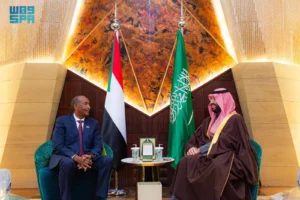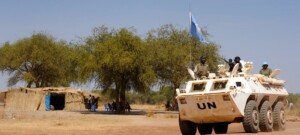Amnesty International urges UN to extend UNAMID mandate
Amnesty International has issued a statement on Wednesday urging the UN Security Council to extend its mandate of the joint peacekeeping mission in Darfur by at least six months “in light of failure by government security forces to protect civilians in recent months”. The joint United Nations-African Union Mission in Darfur (UNAMID) is set to exit on December 31.
 UNAMID troops in East Darfur (UNAMID/Albert González Farran)
UNAMID troops in East Darfur (UNAMID/Albert González Farran)
Amnesty International issued a statement on Wednesday urging the UN Security Council to extend its mandate of the joint peacekeeping mission in Darfur by at least six months “in light of failure by government security forces to protect civilians in recent months”. The joint United Nations-African Union Mission in Darfur (UNAMID) is set to exit on December 31.
“With UNAMID’s mandate due to end at the close of the year, and UNITAMS which is meant to replace it still not yet staffed or operationalised, Amnesty International is concerned for future civilian protection in Darfur, particularly given the national security forces’ failure to step up and protect civilians from attacks in recent months, we fear a security vacuum may arise with disastrous consequences for the people of Darfur,” said Deprose Muchena, Amnesty International’s Director for East and Southern Africa.
The press statement focussed in particular on the continuing violence in Darfur. Two days ago, Radio Dabanga reported that UNAMID identified 47 cases of human rights violations and the displacement of more than 50,000 people in Darfur between September 1 and November 23 of this year
Amnesty also reported that over 70 people, including farmers and internally displaced people, were killed by members of armed groups between July and September 2020 in West Darfur, Central Darfur state, and North Darfur areas that are under the control of Sudanese security forces. According to the International Organization for Migration, more than 8,000 were displaced as a result of the conflict between factions of the Sudan Liberation Movement under the leadership of Abdelwahid El Nur (SLM-AW) in Central Darfur between July and September 2020.
They mention many more cases of violence, especially against farmers. Amnesty International has interviewed witnesses to various attacks between July and September in Fata Borno camp for displaced people in North Darfur, Misterei in West Darfur, and Niertiti locality in Central Darfur.
Rapid Support Forces in Darfur
Especially the role of the Rapid Support Forces in violent incidents was highlighted by Amnesty International. A large Rapid Support Forces (RSF) militia* force is deployed in Darfur “to maintain security, secure the agricultural season, and implement the disarmament campaign”.
However, according to investigations earlier this year, Sudan’s largest paramilitary force carried out nearly 100 attacks against towns, farms, and civilians in North Darfur and Jebel Marra since 2016. A number of these villages have been destroyed and have turned into ghost towns after residents fled the area, satellite images from before and after the attacks show.
One interviewee told Amnesty International: “…armed men wearing Sudan Armed Forces and RSF uniforms attacked us from all directions and killed about nine people and injured 17 or 18 people. They are some people still missing. They looted and burnt houses and the market. Now we have no food or anything. The government sent some security forces at 17:00. I told them you came too late. All the government officials in the locality could not be reached during the attack”.
Attacks by members of the RSF on Sortony camp for the displaced in North Darfur’s Kabkabiya locality also led to the displacement of 760 people.
The RSF seeks to take responsibility for the protection of Darfur people after the UNAMID exit. On Monday, the head of the RSF Training Department, Brig Gen Mohamed Abbas, stated that “the RSF feel great responsibility to protect the people in Darfur after the departure of the UNAMID peacekeepers”.
According to the RSF, only Sudanese forces including the army, the RSF, the General Intelligence Service (GIS*), and the police will be responsible for protecting civilians after the withdrawal of the UNAMID peacekeeping force at the end of this year.
Concerns
“Amnesty International is deeply concerned about the preparedness of the Sudanese forces to take on the sensitive responsibility of civilian protection because they have so far failed to demonstrate willingness and readiness to respond to community pleas for help before and during attacks. The UN and AU must ensure that the Darfur people are not abandoned in a hasty UNAMID withdraw,” said Deprose Muchena.
“The UN Security Council should extend UNAMID’s mandate for at least six to ensure the peacekeepers do not leave before UNITAMS is fully operational, and to enable proper training of national forces to take over the massive responsibility of civilian protection. Otherwise, there will be a security vacuum, with disastrous consequences for the people of Darfur,” Muchena added.
In May this year, a group of Sudanese civil society activists urged Prime Minister Abdallah Hamdok in a petition to add ‘physical protection’ to his request for a new UN force to be deployed in the country.
* Officially, the RSF militia, set up by the ousted Al Bashir regime in 2013, was integrated into the Sudan Armed Forces in August last year. At the same time, however, the militia stays a force unto itself. The RSF, which grew out of the Janjaweed who fought for the Sudanese government in Darfur, is widely believed to be responsible for atrocities in the country in the past seven years. Many Sudanese hold the paramilitaries also accountable for the violent break-up of the Khartoum sit-in in June 3 last year.
* In July 2019, several articles of the 2010 National Security Act were amended, in order to reform Sudan’s infamous National Intelligence and Security Service (NISS), and limit its competences. The new GIS is reportedly no longer authorised to detain people or carry out search operations.
Radio Dabanga’s editorial independence means that we can continue to provide factual updates about political developments to Sudanese and international actors, educate people about how to avoid outbreaks of infectious diseases, and provide a window to the world for those in all corners of Sudan. Support Radio Dabanga for as little as €2.50, the equivalent of a cup of coffee.












 and then
and then